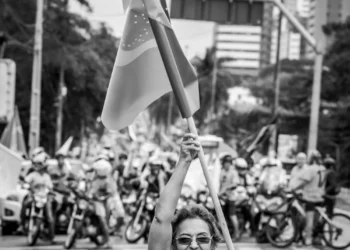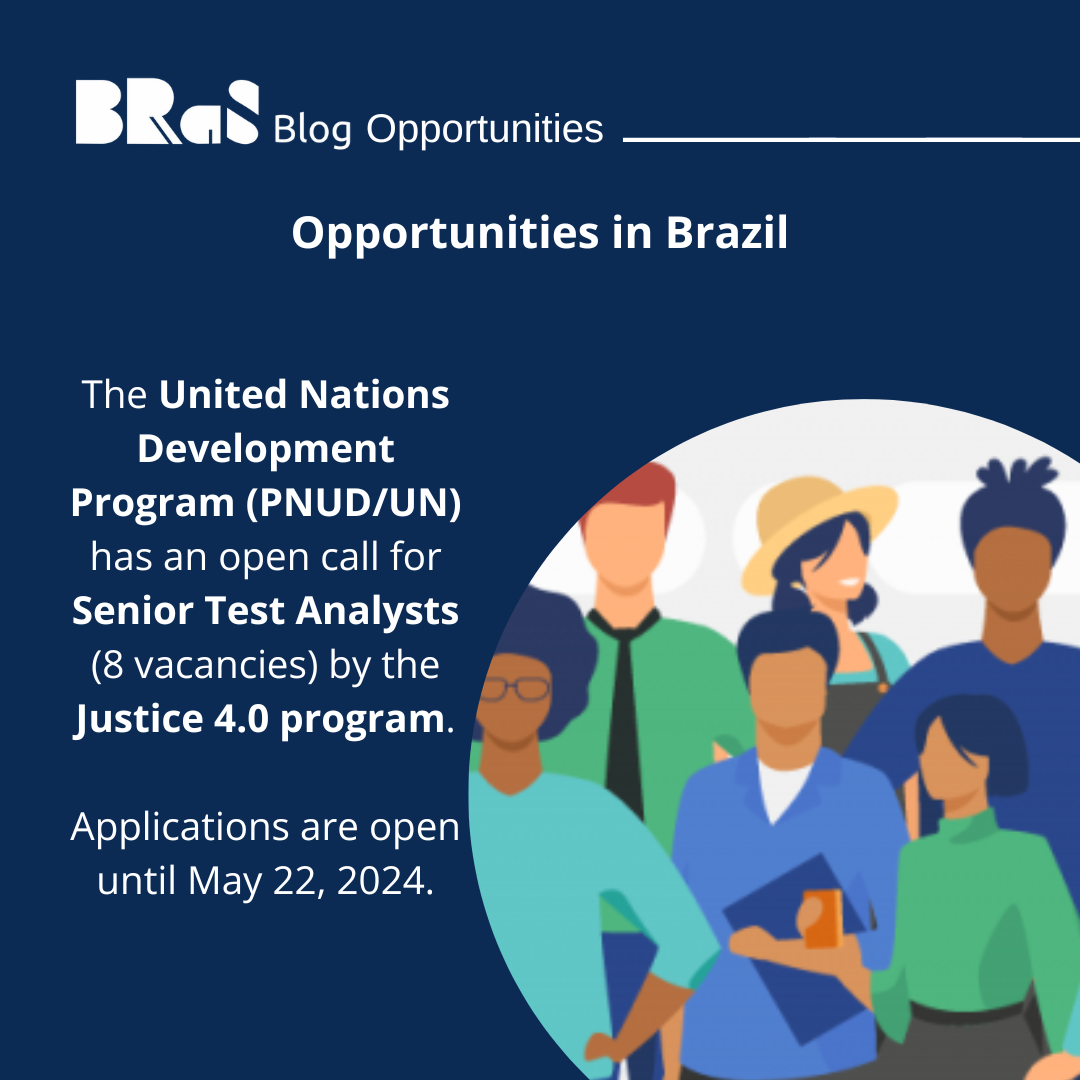by Márcia Inês Schaefer*
Reviewed and edited by Matheus Lucas Hebling
Since 2012, the third Thursday of May has been celebrated as Global Accessibility Awareness Day (GAAD) to get everyone talking, thinking, and learning about digital access and inclusion for people with disabilities.
To participate in the GAAD initiative, as a political scientist, I have chosen to address the topic of electoral accessibility, giving attention to the actions on digital accessibility promoted by the Brazilian Electoral Judiciary. As Silva and de la Rue (2015, p. 320) pointed out, “Citizen participation in the public sphere can only be guaranteed if e-government policies are concerned with creating space for anyone and everyone to access government websites, consult information, and participate in the construction of the political process.”
According to the Brazilian legal framework, which is aligned with the United Nations Convention on the Rights of Persons with Disabilities (CRPD), the definitions of barriers and accessibility are as follows.
The Brazilian Inclusion Law (Law nº 13.146/2015) defines barriers as any obstacles, attitudes, or behaviors that prevent or limit the social and political participation of persons with disabilities, as well as the possibility of enjoying their rights to accessibility, freedom of movement and expression, communication, access to information, understanding, safe circulation, among others.
Six types of barriers are usually identified: urban planning, architectonic, transport, communications, and information, technological, and attitudinal.
In Art. 3, the Brazilian Inclusion Law defines accessibility as the “possibility and condition of reach for use, with safety and autonomy, of spaces, furniture, urban equipment, buildings, transport, information, and communication, including their systems and technologies, as well as other services and facilities open to the public, for public use or private for collective use, both in urban and rural areas, by people with disabilities or reduced mobility.”
As primarily known, political institutions, such as the political parties and the Electoral Judiciary, play an essential role by providing the conditions that people with disabilities can participate in the electoral process by voting and being candidates (Mello et al., 2021). How do our political institutions translate the definition of accessibility into actions in daily activities in a way that builds a more inclusive society for all people?
The answer to this question is not easy because, in Brazil, we have a lack of studies about the electoral participation of persons with disabilities. This is due to historical reasons, such as exclusion and invisibilization processes suffered by these groups, and the recent availability of electoral data on this portion of the population (Mello et al., 2021; Lüchmann, Schaefer, and Mello, 2022; Piccolo, 2023).
We do not yet have a systematic study of how the Brazilian political parties proceed to include persons with disabilities in their party cadres and what level of attention is paid to the issue of accessibility in their daily activities. Mello et al. (2021) mentioned that some political parties have a committee or other internal structure focused on disability issues. Piccolo (2023) noticed that only a few parties provide accessibility resources on their official websites and pages on social media.
On the other side, some studies emphasize the relevance of the Electoral Accessibility Program of the Brazilian Electoral Judiciary (Dias and Junqueira, 2017; Neto, 2020; Mello, 2021). Following the recommendation of the National Council of Justice (CNJ), this program was created in 2012 (Res. TSE nº 23.381/2012) to gradually implement measures to remove physical, architectural, communication, and attitudinal barriers, to promote broad and unrestricted access, with safety and autonomy for people with disabilities or reduced mobility in the electoral process.
The Electoral Accessibility Program has nine main goals:
Provide full accessibility at polling stations;
Adequacy of electronic voting machines with Braille system, audio system, and Libras;
Training of poll workers to assist and facilitate voting by voters with disabilities or reduced mobility;
Make necessary adaptations to websites and procedural monitoring systems to guarantee full access to information available to people with visual impairments;
Through the media sector of the Electoral Courts:
I – in non-election years: carry out awareness campaigns for voters with disabilities or reduced mobility regarding the importance of voting, requesting an update on their situation before the Electoral Court so that it can provide what is necessary to facilitate voting;
II – in an election year: carry out information campaigns for voters with disabilities or reduced mobility regarding the importance of voting, informing: the possibility of, up to 151 days before the election, transfer to polling stations capable of meeting their needs; the possibility of informing the electoral judge of their restrictions and needs, so that the Electoral Court can provide the means to facilitate their voting; and that voters with special needs will be able to count on the assistance of a person they trust during voting;
Permanent updating of the status of voters with disabilities or reduced mobility in the National Voter Register;
Through the Personnel Management Secretariats of the Electoral Courts, implementation of actions aimed at raising awareness about the importance of accessibility and social integration of people with disabilities, training employees on accessibility standards, and eliminating barriers;
Incorporate accessibility actions and goals into the strategic planning of Electoral Courts;
Establishment of a multidisciplinary committee designed to prepare an action plan covering the measures provided for in this Resolution, monitor the activities carried out, and forward the respective report to the Superior Electoral Court by December 20th of each year.
The materialization of the program is through action plans prepared by the permanent accessibility and inclusion committees of all regional electoral courts in the country. These committees are composed of employees from the electoral courts. However, in specific issues, there are often technical cooperations with non-governmental organizations of persons with disabilities, universities, and other government institutions.
There are at least five main actions: management of accessibility and inclusion in the electoral court, accessibility of services, communicational accessibility, technological accessibility, and urban and architectural accessibility.
According to the annual accessibility reports of the Electoral Judiciary, the electoral courts may be progressively promoting digital accessibility following the E-Government Manual (eMAG) and the Web Content Accessibility Guidelines (WCAG).
Some of the digital accessibility services offered are the availability of alternative text in the images used, description of the form contents, shortcut keys, content skipping keys, accessible language, background contrast, and others. Users with difficulty accessing the website’s contents can use the Rybená functionality. Rybená offers the deaf, hearing impaired, partially visual, elderly, illiterate, dyslexic, and others with special needs the possibility of understanding the texts on web pages unsupervised. The software translates texts from Portuguese into Brazilian Sign Language (LIBRAS) and converts written Portuguese to voice.
Some challenges regarding the promotion of accessible digital environments are, for example, the fact that the construction of an inclusive institutional culture requires a lot of study and interest from actors in its implementation; adapting to accessibility can be a time-consuming process, often due to budget limits for purchasing software or paying companies that offer accessibility services, such as LIBRAS interpreters and shorthand.
It is essential to highlight the relevance of dialogue between the electoral judiciary and civil society organizations formed by people with disabilities, as these can contribute significantly to ensuring that accessibility is consistent with the actual demands of these people, as, despite general standards, there are many specificities to guarantee accessibility for different people with disabilities.
Finally, in a country marked by social inequalities that are also reflected in digital inequality (Hansen, 2021), it is essential to consider that many people, with or without disabilities, do not even have digital access. When they do, they are often not instructed on how to use it. In this sense, the debate on digital accessibility is also permeated by the debate on social inequality.
References
Brasil. Lei Nº 13.146/2015. Institui a Lei Brasileira de Inclusão da Pessoa com Deficiência (Estatuto da Pessoa com Deficiência). Disponível em: https://www.planalto.gov.br/ccivil_03/_ato2015-2018/2015/lei/l13146.htm
Conselho Nacional de Justiça. Resolução CNJ N. 401/2021. Dispõe sobre o desenvolvimento de diretrizes de acessibilidade e inclusão de pessoas com deficiência nos órgãos do Poder Judiciário e de seus serviços auxiliares, e regulamenta o funcionamento de unidades de acessibilidade e inclusão. Disponível em: https://atos.cnj.jus.br/atos/detalhar/3987
Dias J, Junqueira ALC. O Direito à Participação Política das Pessoas com Deficiência. Resenha Eleitoral [Internet]. 1º de julho de 2017 [citado 7º de abril de 2024]; 21(2): 159-80. Disponível em: https://revistaresenha.emnuvens.com.br/revista/article/view/96
Global Accessibility Awareness Day (GAAD) Foundation: https://accessibility.day/. It was accessed on April 14th, 2024.
Hansen, Jaqueline Resmini. Desigualdades digitais, políticas e sociais no Brasil: um diálogo entre as abordagens do comportamento político e dos estudos de internet. Tese de Doutorado em Ciência Política, UFMG, 2021. Available from: https://repositorio.ufmg.br/handle/1843/49316
Lüchmann, L. H. H.; Schaefer, M. I.; Mello, A. G. A participação política das pessoas com deficiência no Brasil. In: Karina Lilia Pasquariello Mariano, Lígia Helena Hahn Lüchmann e Rafael da Silva. (Org.). Estudos sobre a participação política no Brasil. 1ed. São Paulo: Cultura Acadêmica, 2022, v. 16, p. 163-196. Available from: https://npms.paginas.ufsc.br/files/2023/04/livro-procad-2-1.pdf
Mello, Anahí Guedes de et al. A participação eleitoral das pessoas com deficiência no Brasil: desafios e perspectivas. Estudos Eleitorais, Brasília, DF, v. 15, n. 2, p. 267-282, jul./dez. 2021. Available from: https://bibliotecadigital.tse.jus.br/xmlui/handle/bdtse/10842
Melo, Liana Holanda de. Direito ao voto da pessoa com deficiência a partir do estudo do Programa de Acessibilidade da Justiça Eleitoral do Ceará. Dissertação de Mestrado em Ciência Política. Lisboa/Portugal: Universidade de Lisboa, 2021. Available from: https://search.proquest.com/openview/977d2ffbfb5ab3bd2005fa341fac7376/1?pq-origsite=gscholar&cbl=2026366&diss=y
Neto, Demétrio Saker. A participação da pessoa com deficiência no sistema eleitoral do estado do Ceará. R. Themis, Fortaleza, v. 18, n. 1, p.71-97, jan./jun. 2020. Available from: https://doi.org/10.56256/themis.v18i1.751
Piccolo GM, Mendes EG. Direito inacessível: pessoas com deficiência e eleições no Brasil. Lua Nova [Internet]. 2023 Sep; (120): 287–323. Available from: https://doi.org/10.1590/0102-287323/120
Tribunal Superior Eleitoral. Instrução Normativa Nº 10, de 10 de agosto de 2022. Regulamenta a gestão de conteúdos dos Portais da Justiça Eleitoral. Disponível em: https://www.tse.jus.br/legislacao/compilada/in/2022/instrucao-normativa-no-10-de-10-de-agosto-de-2022
Tribunal Superior Eleitoral. Resolução TSE nº 23.381/2012. Institui o Programa de Acessibilidade da Justiça Eleitoral e dá outras providências. https://www.tse.jus.br/legislacao/compilada/res/2012/resolucao-no-23-381-de-19-de-junho-de-2012
* Márcia Inês Schaefer is a PhD student in Sociology and Political Science at the Federal University of Santa Catarina. Member of the Research Group about Social Movements (NPMS/UFSC) and BraS Center. Her research interest is mainly electoral and non-electoral participation, focused on the political inclusion of persons with disabilities in Brazil.








